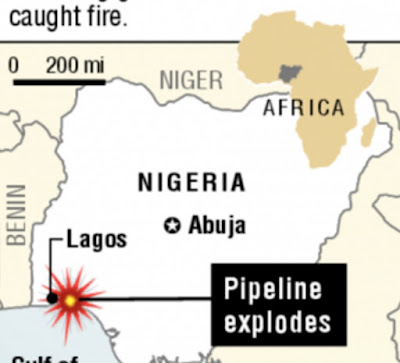In a pipeline explosion Monday near the villages of Oviri Court and Adeje in Nigeria's Delta State, at least 250 people were killed.
The incident is the latest in a series of similar incidents that have occurred as a result of Nigeria's product pipelines being illegally tapped. Nigeria’s state oil firm @NNPCGroup said the blast was caused by a truck that hit some gas cylinders.
LAGOS At least 250 people were killed in Monday's pipeline explosion near the villages of Oviri Court and Adeje in the Delta State of Nigeria. The incident is the latest in a series of similar incidents that have occurred as a result of Nigeria's product pipelines being illegally tapped.
Eyewitnesses said people attempting to gather gasoline ruptured the pipeline on Sunday. The scene of the ruptured pipe was reportedly swarmed with buckets, basins, and other containers by multiple residents of Oviri Court, Adeje, and other neighboring villages. Witnesses said a spark from clashing metal containers triggered the explosion as the villagers scrambled to gather the fuel.
Originally, the Warri pipeline was designed to bring crude to NNPC's Kaduna refinery. Following a prolonged shutdown of the 110,000 b / d Kaduna refinery for repairs, it was changed to transport refined products into the region.
In this village of about 5,000 inhabitants on the highway leading north from Warri and near the Niger Delta town of Jesse, where about 1,000 people died in a similar tragedy in 1998, piles of scorched bodies lay near the pipeline.
Villagers said robbers punctured the pipeline carrying refined petroleum products from Warri to northern Nigeria on Sunday night. Residents went to the region to collect fuel in buckets and sell it for refined goods in the thriving black market in the country, witnesses said.
The same pipeline was pierced and set ablaze on June 3rd at four separate points in the area.
Over 24 hours after the blast, fire crews from the state-run Nigerian National Petroleum Corporation (NNPC) arrived and managed to put out the fire. Such is the magnitude of pipeline fire outbreaks in the Warri region that firefighters have effectively given up all attempts to quench them. The usual practice is to cut the flow in pipes and let the flames burn out.
The network of more than 5,000 km of pipelines crossing the country in Nigeria has been a favorite target of local communities cashing in on the refined goods black market.
President Olusegun Obasanjo, who came to power in May 1999, set up a special task force of helicopter-backed soldiers and police to safeguard pipelines.

